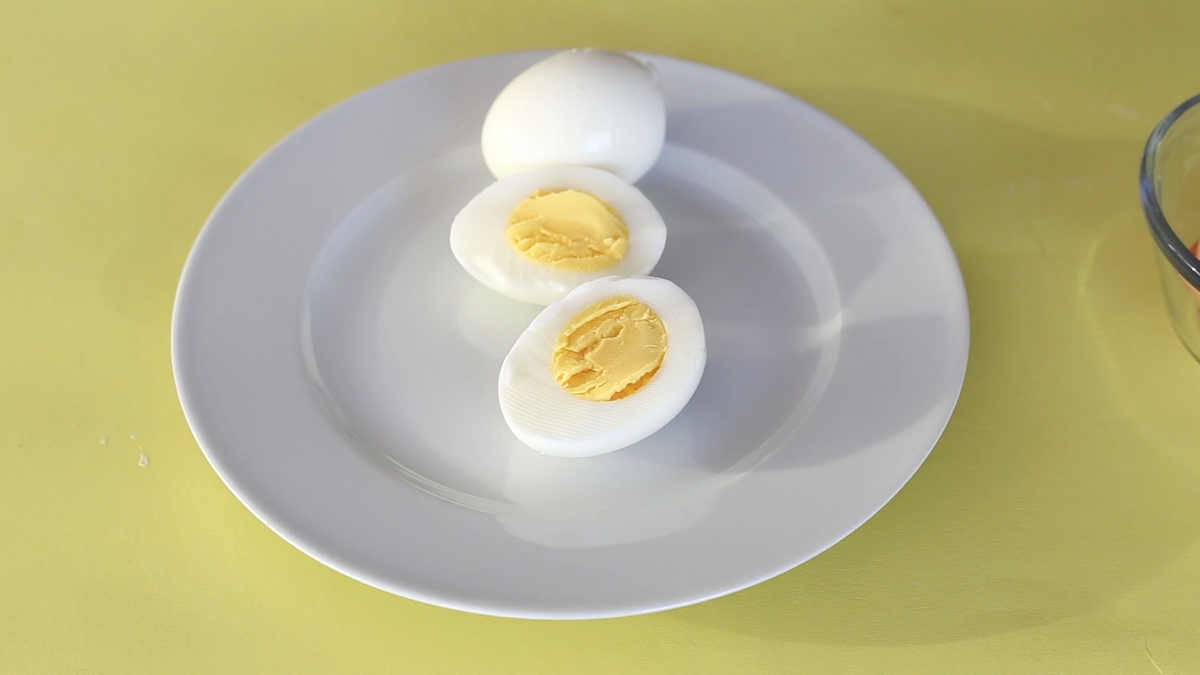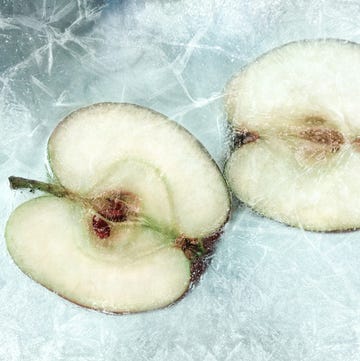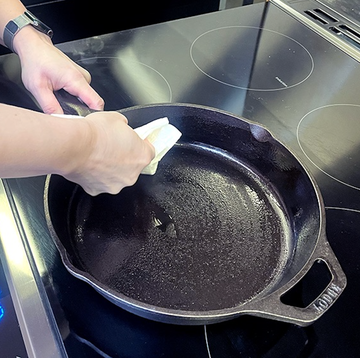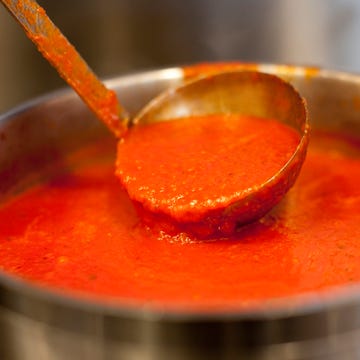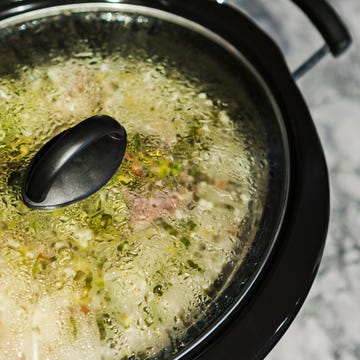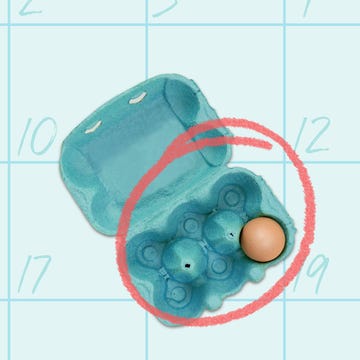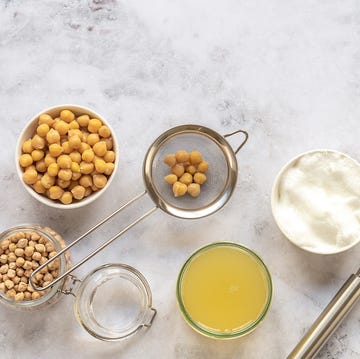Eggs are a hearty addition to almost any meal — but home cooks may not be aware that this versatile breakfast hero is just as hardy, as raw eggs can be successfully frozen months after they were first purchased. Given that egg prices skyrocketed by upwards of 60% in 2022 and remain high due to inflation, freezing eggs that you aren't planning on cooking soon is a smart way to avoid costly waste. Storing your eggs in the freezer isn't as easy as tucking your carton behind your bread, however; home cooks must prep eggs to be stored correctly so various elements of the egg freeze on their own.
You can freeze a whole liquid egg or focus on egg whites alone, but freezing wholly intact egg yolks is extremely difficult, explains Penny Stankiewicz, a professional chef and instructor at the Institute of Culinary Education in New York City. "Egg yolks contain zero water, and it's the water content in eggs that freezes, so they don't behave as well (or as they should!) after being frozen," she tells Good Housekeeping. Whisking eggs or egg whites into a uniform mixture can keep your eggs fresh (and edible!) for up to 8 weeks.
Believe it or not, you may be better off freezing raw eggs than fully cooked eggs, depending on how much time you have to spare in preparation. Below, we're recapping how to freeze raw and cooked eggs, and how long they'll last — plus, the pros and cons of each approach.
How to freeze raw eggs:
The best way to freeze an egg is to freeze it in its whole form, Stankiewicz explains, as you cannot freeze eggs in their shells. You can use this method for as many eggs as you'd like (hopefully, at least 3 or 4!). The best way to freeze eggs often involves freezer-friendly plastic storage bags. But if you know you'll need these eggs for a certain recipe or baked treat, you can portion them out individually in smaller pinch-top bags by freezing the mixture in a plastic ice cube tray first.
Follow these directions for the best results:
- Beat your eggs until yolks have been incorporated, but not so uniform that you've introduced a lot of air into the mixture. Your eggs shouldn't be foaming.
- Pour the egg mixture into a plastic storage bag, or a mold of your choice. If you're using an ice cube tray, it's likely translating to a half egg per cube, for recipe planning purposes.
- If you're using a plastic bag, place the sealed bag on a sheet tray or another surface so it lays flat in the freezer (you can remove the tray once it has frozen).
- If using a mold, allow the egg mixture to freeze entirely (a few hours at most!).
- Remove the mixture from the mold and place it in a tightly sealed plastic bag.
- Stack your plastic bags in a cold corner of your freezer.
Egg whites can also be frozen in a similar manner: Simply separate the yolks from the egg, and pour the mixture either into a mold of your choice or a plastic bag. Either of these mixtures can be used for virtually any recipe you have in mind, and according to Stankiewicz, they can be kept for up to a year if the bag is free of air (vacuum sealed if possible!). Try using them in quick scrambles or even as a pre-portioned addition to almost any baking recipe you have in mind.
While the quality is never as good, you can also technically freeze yolks on their own — if you add salt, sugar, or acid to keep them from becoming thick and unusable. "My suggestion is 1tbsp of sugar per pint of yolks," Stankiewicz advises. "It would also help the final product of the beaten whole eggs to add about half the amount of sugar, so about 1/2 tablespoon per pint of whole beaten eggs."
You'll need some time to defrost these eggs properly, however; allow them to thaw gradually overnight in the refrigerator to prevent any illnesses. "Eggs have to be kept cold to control foodborne illness risk, especially those that have their shell or outer protective coating removed," Stankiewicz says. "If you know what you might use them for, prior to freezing, you could portion them out to your required amount so you are only ever defrosting exactly what you need."
How long do frozen eggs last?
Wondering how long your frozen mixture can remain in the freezer without posing a risk to your health — or worse yet, the quality of your dish? According to materials published by the United States Department of Agriculture (USDA), egg products can be safely stored in functioning freezers for up to one year before they're used. Once they're defrosted, however, they must be consumed — and federal food safety officials note that home cooks may be better off using these frozen eggs in recipes where they'll be fully incorporated (like delicious cookies!).
While frozen eggs may be safe for up to a full year, Stankiewicz says egg quality does deteriorate the longer they are frozen. If you're wishing to keep your eggs tasting delicious — or in perfect form for complex baking recipes where quality is necessary — try to use these specially prepped eggs within two months of storing them. This is especially true for eggs that can't be stored in airtight containers in the freezer.
How to freeze cooked eggs:
Freezing eggs that you've cooked in advance can be more difficult, as it's the texture and quality of your breakfast-to-be can suffer if you're not careful. The best way to freeze cooked eggs is by folding them into other ingredients that'll hold up well in cold temps; believe it or not, the moisture from the ice formed when freezing certain egg dishes can actually help the eggs taste better when they're reheated.
Some of our favorite make-ahead breakfasts are burritos and classic egg sandwiches, which can be held in the freezer for up to a month. Often, a recipe will indicate when cooked eggs can be frozen — and instruct you on how to wrap them beforehand, says Becca Miller, the Good Housekeeping Test Kitchen's associate editor. When it's time to reheat your breakfast in a microwave, remove the wrapping before covering your meal in a new damp paper towel to help retain steam and keep eggs from entirely drying out.
The fridge is also a great place to store your make-ahead breakfasts for the upcoming week. And if you're looking to preserve hard-boiled eggs, great news — they stay fresh in their shell for up to a full week in the fridge. That's a boon for any Easter gathering or deviled egg enthusiast!
Zee Krstic is a content strategy manager for Hearst Magazines, focusing on SEO optimization and other editorial strategies for four brands, including Country Living, House Beautiful, ELLE Decor and VERANDA. He previously served as Health Editor for Good Housekeeping between 2019 and 2023, covering health news, diet and fitness trends as well as executing wellness product reviews in conjunction with the Good Housekeeping Institute. Prior to joining Hearst, Zee fostered a strong background in women's lifestyle media with eight plus years of editorial experience, including as a site-wide editor at Martha Stewart Living after developing a nutrition background as an assistant editor at Cooking Light. Zee produces service-based health coverage, as well as design and travel content, for Hearst brands on a contributor basis; he has written about food and dining for Time, among other publications.

